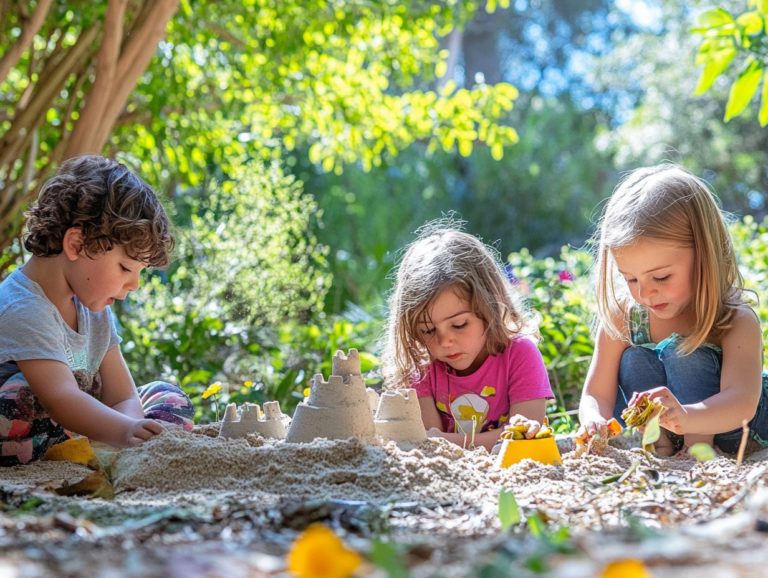What is Mindful Parenting?
In today s fast-paced world, parenting can often seem overwhelming, yet mindful parenting presents a refreshing alternative. This approach emphasizes being present, fostering empathy, and nurturing open communication between you and your child. By incorporating mindfulness and positive parenting strategies, you can enhance your parenting skills and create a more balanced approach to raising children.
You will explore the essence of mindful parenting, its significance, and practical ways to weave it into your daily life. Discover how embracing mindfulness can strengthen your relationship with your child, reduce stress, and encourage positive behavior all while cultivating a more harmonious family environment.
Contents
- Key Takeaways:
- What is Mindful Parenting?
- Why is Mindful Parenting Important?
- How to Practice Mindful Parenting?
- Mindful Parenting
Key Takeaways:

- Mindful parenting involves being present, empathetic, non-judgmental, and encouraging open communication with your child. It integrates coaching techniques and strategies to better understand and meet your child’s emotional needs.
- Practicing mindful parenting can improve the parent-child relationship, reduce stress and anxiety, enhance emotional regulation, promote positive behavior, and foster personal growth in children.
- Incorporating mindful parenting into daily life can be achieved by setting aside time for mindful activities, being mindful in everyday interactions, and modeling mindful behavior for children. This also involves leveraging parenting strategies that promote well-being and emotional security.
What is Mindful Parenting?
Mindful parenting is a cornerstone of positive parenting, emphasizing the development of essential parenting skills for a healthier parent-child relationship. It encourages both parents and children to engage in inner work to foster individual growth and emotional resilience.
Mindful parenting is a deliberate approach that highlights the significance of being fully present and engaged with your children as you nurture their emotional and psychological growth. It incorporates mindfulness practices that enable you to develop awareness, regulate your emotions, and enhance your communication skills. To learn more, explore how to practice mindfulness during parenting, ultimately enriching your relationship with your child.
This engaging parenting style is built on empathy and self-care, promoting positive behavior while establishing a solid foundation for balanced parenting. By embracing mindful parenting, you foster resilience and emotional regulation in your children, equipping them with the skills they need to navigate life s challenges.
Why is Mindful Parenting Important?
Mindful parenting is essential for cultivating a nurturing parent-child relationship, as it fosters emotional regulation and enhances the overall mental health and well-being of both you and your child.
By embracing mindfulness, you can refine your stress management skills, leading to better interactions and minimizing conflicts. This thoughtful approach promotes your child’s developmental growth and helps them feel secure and supported, establishing a robust bond that is vital for meeting their emotional needs. Leveraging coaching resources and training programs can further enhance these skills and provide additional support.
How to Practice Mindful Parenting?
Practicing mindful parenting involves employing a range of actionable strategies that enable you to remain fully present in each moment and respond to your child s emotional needs with genuine empathy and understanding.
By weaving mindfulness techniques into your daily interactions, you can cultivate an environment that nurtures emotional regulation and resilience, ultimately transforming your parenting experience for the better. Engaging in curated growth journeys through platforms like BetterUp can offer additional guidance and support for this transformative process.
This mindful approach not only deepens the bond between you and your child but also enables them to develop their own emotional skills and self-awareness.
Start practicing mindful parenting today and witness the positive changes in your family dynamics!
Mindful Parenting
1. Be Present and Engaged
Being present and engaged as a parent means dedicating your undivided attention to your child. This ensures they feel valued and heard during every interaction. By employing engagement strategies like active listening and minimizing distractions, you can create meaningful moments that foster trust and openness with your children.
Practicing mindful parenting involves consciously turning off electronic devices and setting aside work. Create a distraction-free environment where genuine interaction can flourish. Active listening is key; when you tune into your child’s words, emotions, and body language, you enhance the connection and understanding between you. These strategies strengthen communication and significantly contribute to your child’s emotional security and resilience. To delve deeper into this approach, consider exploring the benefits of mindful parenting.
When your children sense that you are fully present, they often show improved behavior and a greater willingness to express themselves, ultimately deepening your overall relationship.
2. Cultivate Empathy and Understanding
Cultivating empathy and understanding is essential in mindful parenting. It allows you to connect with your child’s emotional needs on a deeper level. By embracing compassionate parenting, you can develop a greater awareness of your child’s feelings and behaviors. This fosters a nurturing environment that promotes growth and helps in managing emotions.
This emotional connection strengthens the bond between you and your child and equips them to express their feelings openly. To enhance this connection, engage in active listening; focus entirely on what your child is saying. Validate their emotions by reflecting back what you hear. Incorporating shared activities like reading or playing together creates meaningful opportunities for interaction.
By modeling empathy, you instill its importance in your children, encouraging them to nurture their emotional intelligence. This journey of compassionate parenting benefits your child’s emotional development and cultivates a harmonious family dynamic. Techniques from coaching and personal development can further enhance these efforts, supporting overall family well-being.
3. Practice Non-Judgment

Practicing non-judgment as a parent cultivates an accepting atmosphere where children feel secure enough to express themselves without the threat of criticism. This aspect of mindful parenting paves the way for meaningful behavior change. It allows both you and your children to focus on emotional regulation and personal growth free from judgment.
When you embrace non-judgment, you model healthy emotional responses and create a nurturing environment that encourages self-care. This approach teaches children the importance of acknowledging their feelings without shame or fear, setting the stage for constructive conversations about behavior. Mistakes become opportunities for growth rather than sources of defeat. Integrating innovative coaching techniques can further support personal growth and emotional resilience.
By fostering emotional intelligence this way, you guide your children toward developing coping strategies that enhance their resilience. This reinforces the value of a non-judgmental mindset that extends beyond the family unit.
4. Encourage Open Communication
Encouraging open communication within your family is fundamental to mindful parenting. It creates an environment where your children can express their thoughts and feelings freely, fostering trust and understanding. By developing strong communication skills through active dialogue and creative thinking, you not only support your child s development but also equip your family with effective strategies for resolving conflicts.
When you actively listen and validate your child s emotions, you create a safe space where they feel valued and heard. This experience builds their self-esteem and encourages them to articulate their needs an essential skill for navigating interpersonal relationships. Practicing techniques like listening carefully and responding to show understanding and empathy enhances understanding, reducing the likelihood of misunderstandings that can lead to conflict. Fostering work-life balance contributes to a more harmonious family environment.
As your children witness you modeling healthy communication, they are more likely to adopt these behaviors themselves. This makes it easier for them to tackle challenging discussions and resolve differences effectively. Ultimately, fostering such an environment nurtures emotional intelligence and resilience in your children vital traits for their overall development.
The Transformative Benefits of Mindful Parenting
Mindful parenting presents a wealth of advantages that can transform the dynamics between you and your child, greatly enriching your relationship while fostering emotional regulation and reducing stress. Integrating practices from holistic wellness and community support can further amplify these benefits, ensuring a well-rounded approach to parenting.
By cultivating a nurturing and attentive atmosphere, you can pave the way for enhanced communication, resilience, and positive behavior patterns within your family elements that are essential for healthy child development.
1. Improves Parent-Child Relationship
Mindful parenting can significantly enhance the parent-child relationship by fostering deeper connections rooted in empathy, active listening, and emotional regulation. This approach nurtures resilience in children and enables them to trust you and express their feelings openly, laying the foundation for a secure attachment. Utilizing resources from executive coaching and platforms like BetterUp can further support this development.
When you practice mindfulness, you become attuned to your own reactions, which in turn models emotional regulation for your children. This awareness strengthens your bond and cultivates your child’s ability to navigate emotional challenges.
As a mindful parent, you approach difficult moments with patience, turning them into teaching opportunities for your children to learn how to cope with their own feelings. Understanding your child s unique emotions fosters growth, trust, and love, improving your relationship significantly. Involving elements of personal development and coaching can further enhance this process.
2. Reduces Stress and Anxiety
One of the key benefits of mindful parenting is its remarkable ability to reduce stress and anxiety for both you and your children. By embracing mindfulness techniques, you can cultivate emotional regulation, leading to calmer interactions and a more harmonious home environment. Drawing from therapeutic practices and behavioral health strategies can further support stress reduction and overall well-being.
Incorporating practices such as deep breathing exercises, meditation, and intentional communication can serve as powerful tools for you to enhance your mental health and create a nurturing atmosphere. These mindfulness strategies encourage you to stay present, allowing you to respond thoughtfully rather than react impulsively during stressful moments. Techniques like A.I. coaching and BetterUp can also provide invaluable support in achieving mental clarity and being in the present moment.
As a result, you’ll likely see positive shifts in family dynamics, fostering deeper connections and emotional resilience among all family members. This practice not only helps you manage your own anxiety but also teaches your children valuable skills for coping with their feelings, ultimately promoting a sense of security and well-being within your family unit. Implementing these strategies can also contribute to improved conflict resolution, benefiting the overall learning environment at home.
Conclusion
In summary, mindful parenting plays a crucial role in enhancing parent-child relationships, reducing stress, and fostering open communication within families. By adopting these practices, you can create a nurturing environment that supports both your development and that of your children, leading to healthier emotional growth and deeper connections. Imagine a home where every voice is heard and valued; transform your parenting journey today!
3. Enhances Emotional Regulation
Mindful parenting enriches emotional regulation by equipping both you and your children with the tools to recognize and manage emotions effectively. This approach promotes healthier behavior changes and personal growth. By embracing mindfulness, your family can cultivate coping strategies that foster emotional resilience and understanding. Holistic coaching methods can further support these goals, providing a well-rounded approach to emotional well-being.
Incorporating techniques such as deep breathing exercises, active listening, and reflective pause practices allows you to create a nurturing environment that encourages open communication. You have the opportunity to model these skills, showing your children how to navigate challenging emotions without falling into reactive behaviors. Programs like Bren Brown’s Daring Leadership Institute offer valuable tools to enhance these skills.
As your children see this, they’ll learn to identify their feelings, articulate their needs, and engage in problem-solving, setting the stage for a more harmonious family dynamic. This not only benefits childhood education but also prepares them for success in innovative organizations as they grow older.
Embarking on this journey boosts emotional intelligence for everyone in the family, strengthening your bond and fostering collective growth that reverberates through all areas of life.
4. Promotes Positive Behavior

Promoting positive behavior emerges as a fundamental outcome of mindful parenting, as it encourages you to respond to your child’s emotional needs with empathy and understanding. By honing your communication skills and creating a supportive space, you can effectively guide your child toward exhibiting more positive behaviors.
This approach not only addresses your child’s immediate reactions but also fosters long-term emotional intelligence and resilience. When you practice mindfulness, you become attuned to the subtle cues your child provides, significantly enhancing your parent-child relationship. By validating their feelings and encouraging open dialogue, you enable your child to articulate their emotions and needs, nurturing a sense of security and self-worth.
As your child feels understood and valued, they’re more likely to demonstrate respectful and considerate behavior toward others, creating a positive feedback loop that reinforces those desirable actions.
How to Incorporate Mindful Parenting into Daily Life?
Incorporating mindful parenting into your daily life entails practical strategies that are effortlessly integrated, allowing mindfulness to enrich your interactions with your children.
Make time for mindful activities now to enrich your family’s emotional health and emphasize a healthy work-life balance. This creates a nurturing environment that fosters emotional growth and deepens connection. Resources like BetterUp can assist in maintaining this balance, ensuring that both personal and professional aspects of life are well-managed.
1. Set Aside Time for Mindful Activities
Setting aside time for mindful activities is crucial for nurturing a mindful parenting approach, as it enables you and your family to engage in practices that promote personal growth and emotional regulation. Activities like mindful meditation, nature walks, or family yoga can help cultivate awareness and strengthen emotional bonds. These activities also create a positive learning environment for your children, enhancing their overall development.
By weaving these practices into your routine, you create a shared space for reflection that enhances your understanding of each other’s emotions. For instance, mindful meditation serves as a soothing outlet, allowing family members to collectively manage stress and anxiety. Nature walks encourage exploration and appreciation of the surroundings while providing an opportunity for everyone to practice being present in the moment.
Similarly, family yoga not only fosters physical awareness but also encourages healthy communication. Engaging in these activities enhances individual emotional resilience and nurtures a supportive family dynamic, where each member feels more connected and understood by one another.
2. Be Mindful in Everyday Interactions
Being mindful in your everyday interactions is a great way to implement mindful parenting. It encourages you to stay fully present and engaged with your children during those routine activities that often slip by unnoticed.
By employing active listening and engagement strategies, you can forge meaningful connections that foster trust and openness. Incorporating techniques like maintaining eye contact, reflecting back what your children say, and putting away distractions such as phones or televisions during conversations can significantly enhance these interactions.
Consider the moments you share with your little ones be it mealtime or playtime as precious opportunities to connect on a deeper level. By consciously practicing mindfulness, you not only model these behaviors for your children but also cultivate a nurturing environment where feelings and thoughts can flow freely.
This commitment to being present lays the groundwork for healthier communication and strengthens the emotional bond between you and your children.
3. Model Mindful Behavior for Children
Modeling mindful behavior for children is crucial to mindful parenting, as they absorb lessons from observing their parents and caregivers. By showcasing understanding and controlling feelings through mindfulness practices, you can impart these invaluable skills to your children.
When you consistently embrace mindfulness, you cultivate an environment steeped in emotional intelligence, enabling your children to understand and manage their feelings effectively. This intentional approach nurtures resilience, allowing them to face challenges with a balanced mindset.
By demonstrating positive communication, you enhance their interpersonal relationships and foster empathy. As your children observe you handling stress with grace and patience, they are more likely to adopt similar strategies in their own lives.
Ultimately, this foundational experience shapes future generations, equipping them with the essential tools for emotional well-being and personal success.
Frequently Asked Questions
Curious about mindful parenting? What is Mindful Parenting?

Mindful parenting is a style of parenting that involves being present and aware in the moment with your child while also being attentive to your own thoughts and emotions.
How does Mindful Parenting differ from traditional parenting?
Mindful parenting differs from traditional parenting in that it focuses on being present and non-judgmental, rather than controlling or correcting your child’s behavior.
What are the benefits of practicing Mindful Parenting?
Practicing Mindful Parenting can lead to better communication and connection with your child, reduced stress and anxiety for both parent and child, and improved emotional regulation and problem-solving skills.
How can I incorporate Mindful Parenting into my daily routine?
Start your mindful parenting journey today! Here s how you can easily weave it into your routine: You can incorporate Mindful Parenting into your daily routine by taking a few mindful moments throughout the day, practicing deep breathing or mindful awareness while engaging in daily activities with your child, and setting aside dedicated time for mindful activities such as meditation or yoga.
Is Mindful Parenting only for parents with young children?
No, Mindful Parenting can be practiced with children of all ages. The principles of being present, non-judgmental, and attentive to your own thoughts and emotions can benefit parents and children at any stage of life.
Do I have to be a perfect parent to practice Mindful Parenting?
No, Mindful Parenting is not about being a perfect parent. It is about being aware of your own thoughts and emotions and making a conscious effort to be present and non-judgmental in your interactions with your child.
Give mindful parenting a try and share your experiences with others! You might find it’s a rewarding journey for both you and your children.






